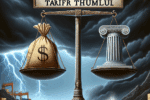Washington, D.C. — In a significant shift within the nation’s cultural institutions, the Trump administration has dismissed the Librarian of Congress, Carla Hayden, a decision that has sparked a wave of both support and criticism. Appointed in 2016, Hayden has been a trailblazer as the first woman and the first African American to lead the Library of Congress, a position that has traditionally been free from political upheaval.
Her tenure marked a pivotal effort to modernize the expansive library system, which houses millions of books, recordings, photographs, and manuscripts. Hayden advocated for increased digital access to the Library’s resources, making efforts to engage a diverse audience and enhance the institution’s relevance in an increasingly digital world. The decision to remove her comes at a time when many institutions are grappling with how best to evolve and serve their constituents.
Supporters of Hayden argue her leadership was essential for adapting the Library of Congress to contemporary needs, illuminating the role of libraries in cultural preservation and education. They point to her commitment to diversity and inclusion as fundamental attributes of her tenure. Critics, however, believe the decision reflects broader political maneuvers, suggesting the removal was driven by an agenda aimed at reshaping public institutions in line with a specific ideology.
The Library of Congress is one of the most important research libraries globally, and its leadership decisions often reverberate throughout the library and information science community. Observers note that the dismissal of a figure as groundbreaking as Hayden sends a chilling message about the kind of leadership that may be welcomed in public institutions.
Political analysts are noting the implications of this change, particularly how it might influence future appointments in similarly apolitical roles. As the library strives to maintain its mission amidst evolving sociopolitical currents, many are left wondering how this shift will affect the institution’s direction and programming.
As the dust settles on this significant administrative move, the Library of Congress faces the challenge of navigating a future that balances tradition with innovation, all while adhering to its vital role as a custodian of American history and culture. The administration’s decision underscores the intersection of politics and culture—an area that is increasingly under scrutiny in today’s world.










